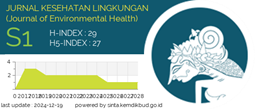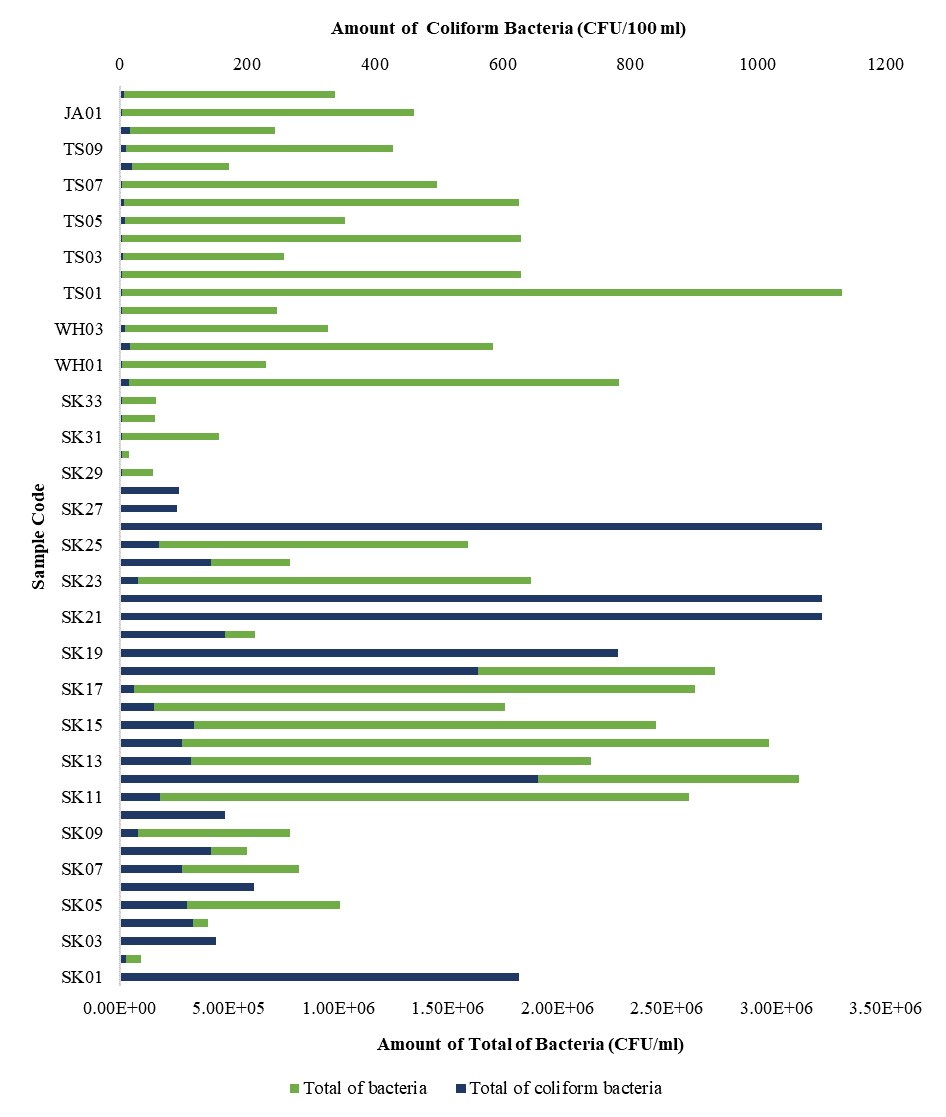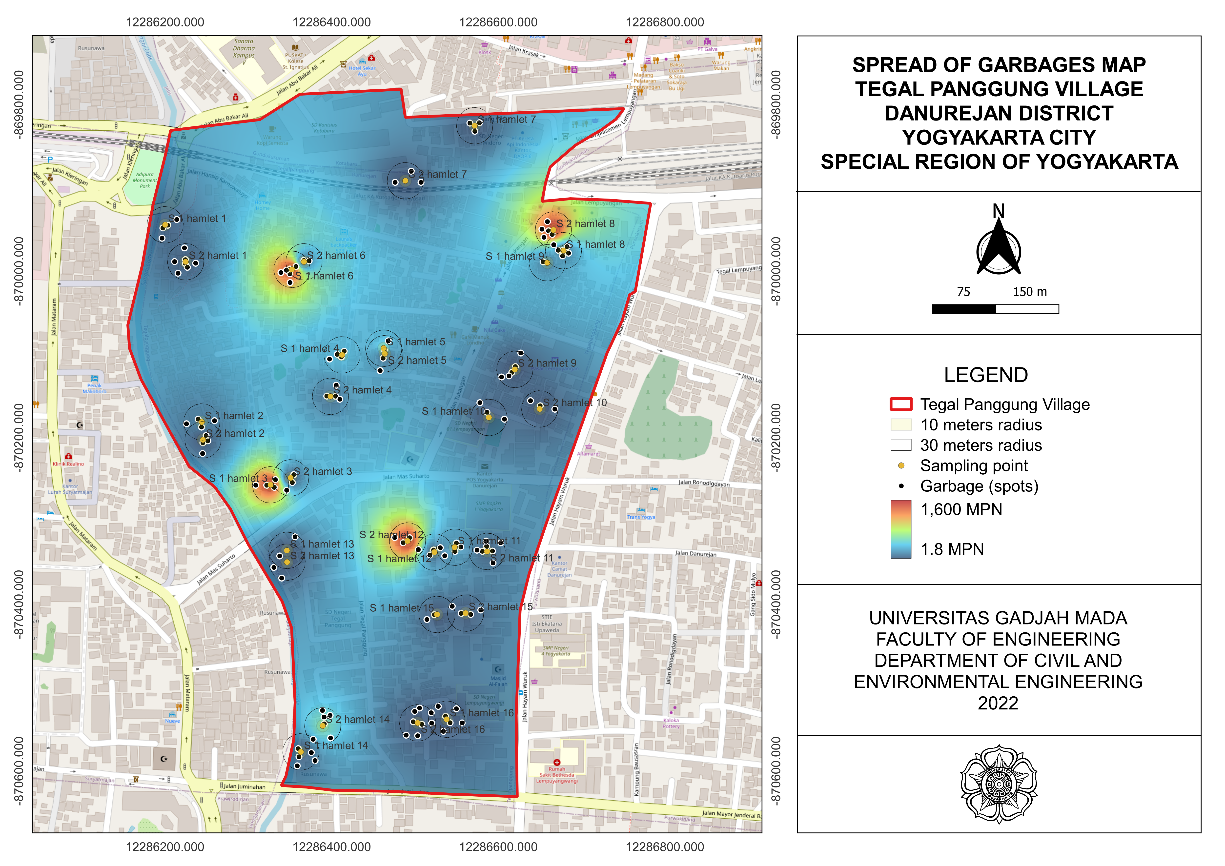Food Sanitation and Hygiene Practice in Foods Purchasing during the Early Period of Covid19 Pandemic in Greater Jakarta, Indonesia: An Online Study

Introduction: The Covid19 pandemic has greatly impacted all aspects of life, including the behavior of food purchasing. This study aims to identify the description of food hygiene and sanitation practices as part of the food safety aspect in the practice of food purchasing in Greater Jakarta, Indonesia. Methods: Data collection was conducted online in May 2020 from 411 respondents including data on sociodemographic, the proxy of knowledge level, perceptions, sources of information related to food handling, and the practice of food sanitation, and hygiene during the pandemic. Food sanitation and hygiene practices were assessed using a composite index of variables based on the Five Keys to Safer Food and preventive measures during the pandemic. Logistic regression analysis was conducted to assess factors associated with food sanitation and hygiene practices. Results and Discussion: Sufficient practice on food sanitation and hygiene is still relatively low (41.6%). An increased risk of poor food sanitation and hygiene practices was observed in people with less attention on the virus transmission while doing direct shopping, had a non-permanent job, single source of information on food handling during a pandemic, and were currently not married. Changes in the frequency of direct food purchasing and method of online food purchasing were shown as protective factors to better food and sanitation hygiene practice. Conclusion: The food sanitation hygiene practices of consumers during the pandemic in Indonesia are classified as unfavorable. Educational interventions using multi-source of media information are recommended to promote good hygiene food sanitation practices during the pandemic.
Centers for Disease Control and Prevention. Basics of COVID-19. Washington DC: Centers for Disease Control and Prevention; 2021. https://www.cdc.gov/coronavirus/2019-ncov/your-health/about-covid-19/basics-covid-19.html
Ministry of Health of Republic Indonesia. Guidelines for the Prevention and Control of Coronavirus Diseases (COVID-19), 5th Revision. Jakarta: Ministry of Health of Republic Indonesia; 2020. https://covid19.kemkes.go.id/protokol-covid-19/kmk-no-hk-01-07-menkes-413-2020-ttg-pedoman-pencegahan-dan-pengendalian-covid-19
European Food Safety Authority. Coronavirus: No Evidence that Food is A Source or Transmission Route. Parma: European Food Safety Authority; 2020. https://www.efsa.europa.eu/en/news/coronavirus-no-evidence-food-source-or-transmission-route
Van Doremalen N, Bushmaker T, Morris DH, Holbrook MG, Gamble A, Williamson BN, et al. Aerosol and Surface Stability of SARS-CoV-2 as Compared with SARS-CoV-1. N Engl J Med. 2020;382(16):1564–1567. https://doi.org/10.1056/NEJMc2004973
Gao X, Id XS, Guo H, Liu Y. To Buy or Not Buy Food Online : The Impact of the Covid19 Epidemic on the Adoption of E-Commerce in China. PLoS One. 2020;15(8):e0237900. https://doi.org/10.1371/journal.pone.0237900
Hassen TB, Bilali HE, Allahyari MS. Impact of Covid19 on Food Behavior and Consumption in Qatar. Sustain. 2020;12(17):1–18. https://doi.org/10.3390/su12176973
Zhao Y, Bacao F. What Factors Determining Customer Continuingly Using Food Delivery Apps During 2019 Novel Coronavirus Pandemic Period?. Int J Hosp Manag. 2020;91(102683):1-12. https://doi.org/10.1016/j.ijhm.2020.102683
Muangmee C, Kot S, Meekaewkunchorn N, Kassakorn N, Khalid B. Factors Determining the Behavioral Intention of Using Food Delivery Apps During Covid19 Pandemics. J Theor Appl Electron Commer Res. 2021;16(5):1297–310. https://doi.org/10.3390/jtaer16050073
Aprilianti I, Amanta F. Promoting Food Safety in Indonesia's Online Food Delivery Services. Jakarta: Center for Indonesian Policy Studies; 2020. https://doi.org/10.13140/RG.2.2.29722.67524
Grashuis J, Skevas T, Segovia MS. Grocery Shopping Preferences during the Covid19 Pandemic. Sustainibility. 2020;12(5369):1–10. http://dx.doi.org/10.3390/su12135369
Ogundijo DA, Tas AA, Onarinde BA. Exploring the Impact of Covid19 Pandemic on Eating and Purchasing Behaviours of People Living in England. Nutrients. 2021;13(5):1499. https://doi.org/10.3390/nu13051499
The Nielsen Company. Race Againts The Virus: Indonesian Consumers' Response Towards Covid19. United States: The Nielsen Company; 2020. https://www.nielsen.com/id/en/insights/article/2020/race-against-covid-19-deep-dive-on-how-indonesian-consumers-react-towards-the-virus/
Olaimat AN, Shahbaz HM, Fatima N, Munir S. Food Safety During and After the Era of Covid19 Pandemic. Front Microbiol. 2020;11(1854):1–6. https://doi.org/10.3389/fmicb.2020.01854
Ministry of the State Secretariat. Law of the Republic of Indonesia Number 18 year 2012 about Food. Jakarta: Ministry of the State Secretariat; 2012.
World Health Organization. Five Keys to Safer Food Manual. France: World Health Organization; 2006. https://www.who.int/publications-detail-redirect/9789241594639
Faour-klingbeil D, Osaili TM, Al-nabulsi AA, Jemni M, Ewen C. An On-Line Survey Of The Behavioral Changes in Lebanon, Jordan and Tunisia during the Covid19 Pandemic Related to Food Shopping, Food Handling, and Hygienic Practices. Food Control. 2021;125(107934):1–10. https://doi.org/10.1016/j.foodcont.2021.107934
Min S, Xiang C, Zhang X heng. Impacts of the Covid19 Pandemic On Consumers' Food Safety Knowledge and Behavior in China. J Integr Agric. 2020;19(12):2926–2936. https://doi.org/10.1016/S2095-3119(20)63388-3
World Health Organization. Coronavirus Disease 2019 (Covid19) World Health Situation Report - 5: Indonesia. Geneva: World Health Organization; 2020. https://cdn.who.int/media/docs/default-source/searo/indonesia/covid19/who-situation-report-5.pdf?sfvrsn=f1d00104_2
The Food Industry Association. U.S. Grocery Shopper Trends: The Impact of COVID-19. United States: The Food Industry Association; 2020. https://www.fmi.org/blog/view/webinar-recordings-public/2020/05/07/u.s.-grocery-shopper-trends-the-impact-of-covid-19
Candra S, Ayudina M, Arashi MA. The Impact of Online Food Applications during the Covid19 Pandemic. Int J Technol. 2021;12(3):472–484. https://doi.org/10.14716/ijtech.v12i3.4195
Galanakis CM. The Food Systems in the Era of the Coronavirus (Covid19) Pandemic Crisis. Foods. 2020;9(523):1–10. https://doi.org/10.3390/foods9040523
World Health Organization, United Nations International Children's Emergency Fund. Progress on Sanitation and Drinking Water: 2015 Update and MDG Assessment [Internet]. Geneva: WHO Press; 2015. https://www.unicef.org/reports/progress-sanitation-and-drinking-water
Desai AN, Aronoff DM. Food Safety and COVID-19. JAMA. 2020;323(19):1982. https://doi.org/10.1001/jama.2020.5877
Velebit B, Djordjevic V, Milojevic L, Babic M, Grkovic N, Jankovic V, et al. The common foodborne viruses : A review. In: Font i Furnols M et al., editor. IOP Conf Series: Earth and Environmental Science. Serbia: Institute of Physics Publishing (IOP); 2019. https://doi.org/10.1088/1755-1315/333/1/012110
Machida M, Nakamura I, Saito R, Nakaya T, Hanibuchi T. Incorrect Use of Face Masks during the Current Covid19 Pandemic among the General Public in Japan. Int J Environ Res Public Health. 2020;17(6484):1–11. https://doi.org/10.3390/ijerph17186484
World Health Organization. Advice on the Use of Masks in the Community, During Home Care and in Health Care Settings in the Context of the Novel Coronavirus ( 2019-nCoV) Outbreak: Interim Guidance. Geneva: World Health Organization; 2020. https://apps.who.int/iris/handle/10665/330987
Yadav DK, Shah PK, Shah SP. The Use of Disposable Gloves by General Public During Covid19 Increases the Risk of Cross-Contamination. Asia Pacific J Public Hea. 2020;35(2):289–2891. https://doi.org/10.1177/1010539520932704
Ugoani JNN, Ewuzie MA. Management Perspectives of Food Safety and Poor Personal Health Management Among Blue-Collar Workers in Nigeria. Am J Food Sci Heal. 2016;2(5):107–116. http://files.aiscience.org/journal/article/html/70160056.html
Copyright (c) 2022 JURNAL KESEHATAN LINGKUNGAN

This work is licensed under a Creative Commons Attribution-NonCommercial-ShareAlike 4.0 International License.
1. Copyright of all journal manuscripts is held by the Jurnal Kesehatan Lingkungan.2. Formal legal provisions to access digital articles of electronic journal are subject to the provision of the Creative Commons Attribution-ShareAlike license (CC BY-NC-SA), which means that Jurnal Kesehatan Lingkungan is rightful to keep, transfer media/format, manage in the form of databases, maintain, and publish articles.
3. Published manuscripts both printed and electronic are open access for educational, research, and library purposes. Additionally, the editorial board is not responsible for any violations of copyright law.
JKESLING by UNAIR is licensed under a Creative Commons Attribution-ShareAlike 4.0 International License.







































